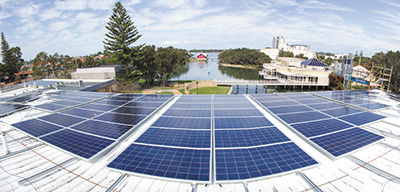In the past three years, the City of Mandurah has reduced its greenhouse gas emissions by 10.7 percent through consistent investment in renewable energy.
The City has a leadership role within the community, driving and sustaining action on climate change.
A number of renewable energy projects have been introduced by the City, which has helped to reduce the City’s carbon footprint emissions and in order to meet its 2020 Carbon Neutral targets.
Chief Executive Officer Mark Newman said these results are a great example of the City’s dedication to saving energy and helping to conserve the environment.
“Our community has told us that the environment is one of their top priorities, and we are committed to taking action to decrease our impact on the environment in a number of different ways,” he said.
The City has prioritised the investment into solar energy, which has significantly decreased energy consumption, greenhouse gases and operating costs.
The City’s Solar Plan has reduced the City’s greenhouse gas emissions by five percent.
The City’s solar energy system is reaching a total 338kW capacity, cutting annual operating costs by $155,000, electricity consumption by more than 500,000kWh and saving more than 400 tonnes of CO2-e from being released into the atmosphere.
The following initiatives also demonstrate the City’s commitment towards reducing its carbon footprint:
- A LED Plan is also being implemented, targeting the retrofitting of all fluorescent lights in Council buildings with 2,500 units to be replaced to LED. (This represents an annual cost saving of more than $49,000, and an emissions reduction of more than 100 tonnes of CO2-e).
- More than 1000 City-owned streetlights will also be retrofitted. This will achieve a 40-60 percent decrease in energy consumption and emissions.
- Newly installed streetlights unit will be now fitted with LEDs.
- The City recently signed up to the Compact of Mayors, reinforcing its determination to lead actions on climate change at national and international levels.
The City has a long history of providing leadership within the community and driving action on climate change.
In 1999, Council joined the Cities for Climate Protection Program and in 2011 adopted the Corporate Emissions Reduction Strategy (CERS) as part of their ongoing commitment towards a sustainable future.

















